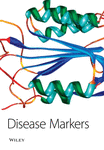Evaluation of the Role of LRRK2 Gene in Parkinson’s Disease in an East Indian Cohort
Abstract
Leucine rich repeat kinase 2 (LRRK2) gene defects cause Parkinson′s disease (PD). Recently, LRRK2 has also been shown by genome wide association (GWA) studies to be a susceptibility gene for the disease. In India mutations in LRRK2 is a rare cause of PD. We, therefore, genotyped 64 SNPs across LRRK2 in 161 control samples and finally studied 6 haplotype tagging SNPs for association-based study on 300 cases and 446 ethnically matched controls to explore the potential role of LRRK2 as a susceptibility gene in PD for East Indians. We did not find any significant allele/ genotype or haplotype associations with PD suggesting that common genetic variants within LRRK2 play limited role in modulating PD among East Indians. In addition, we also screened for the common mutations (viz. p.R1441C, p.R1441G, p.R1441H, p.Y1699C, p.G2019S), and a risk variant common among Asians (p.G2385R) but did not observe any of the above mentioned variants in our cohort. Our study, therefore, strongly suggests that LRRK2 has minimal role as a candidate and susceptibility gene in PD pathogenesis among East Indians.




